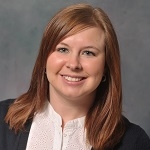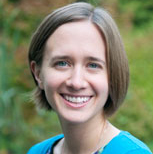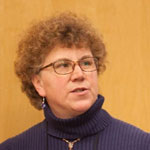“Challenging,” social media in higher education?
In higher education, social media can be magic, but it can also be very challenging.
As a social media professional, it can be difficult to deal with the challenges of the job.
That’s why I asked the 12 higher ed professionals of the 4th Higher Ed Social Media Conference about the most difficult part(s) of their social media job and how they deal with these challenges.
Check out these top challenges – and possible solutions – for higher ed social media pros identified by 12 of your higher ed colleagues.
Finding time for strategy for Tiffany Broadbent Beker, Web Developer & Social Media Coordinator – William & Mary
 I currently focus on social media strategy and analytics and stepping out of the everyday to look at the big picture is always an interesting challenge. You can easily get wrapped up in what’s going on this month, or this semester, but taking the time to step back and really look at all our channels, how they fit together with all their different audiences, their strengths and weaknesses, is a daunting task but also an intriguing challenge.
I currently focus on social media strategy and analytics and stepping out of the everyday to look at the big picture is always an interesting challenge. You can easily get wrapped up in what’s going on this month, or this semester, but taking the time to step back and really look at all our channels, how they fit together with all their different audiences, their strengths and weaknesses, is a daunting task but also an intriguing challenge.
Setting aside time explicitly to devote to this kind of “big thinking†has been really useful for me, whether it be hunkered down in a study carrel in our library or scheduling a brainstorming meeting with our social media team.
Similarly, not getting bogged down in all of the data available from the various social media channels is always a trick. Making sure I’m getting past “I got X likes on this post†to “What does getting X likes on this post really mean?†is something I’m always trying to keep in the forefront of my analysis.
The desire to be everywhere and the need for damage control for Corie Martin, Director, Web Services & Digital Marketing – Western Kentucky University
 One challenge that I have been working on this year is that there is an ever-increasing amount of output channels, and still only two people on my team. It is really hard to be everywhere, especially when you are covering live events. How can we shoot a live video, live tweet, snap, and insta events from multiple accounts simultaneously, while also taking a time-lapse or 360 video, or still images for the website? The short answer is, you can’t, which means you have to strategically pick and choose your media, or call in reinforcements (which we do a lot of here at WKU). Live event coverage is something that has to be planned out in advance to be sure your media is lined up, feet on the ground are in all the right places, and that your messages are disseminated when and where you need them to be. It has changed the scope of the job for sure.
One challenge that I have been working on this year is that there is an ever-increasing amount of output channels, and still only two people on my team. It is really hard to be everywhere, especially when you are covering live events. How can we shoot a live video, live tweet, snap, and insta events from multiple accounts simultaneously, while also taking a time-lapse or 360 video, or still images for the website? The short answer is, you can’t, which means you have to strategically pick and choose your media, or call in reinforcements (which we do a lot of here at WKU). Live event coverage is something that has to be planned out in advance to be sure your media is lined up, feet on the ground are in all the right places, and that your messages are disseminated when and where you need them to be. It has changed the scope of the job for sure.
Another challenge is damage control via social media. Often, higher ed social media admins catch things first, so we are the first point of contact on campus issues that sometimes require swift action, response, or resolution. Working with administrators, personnel across campus, faculty, and students is a challenge, particularly when you are pressed for time to release news, or provide updates. It has been a challenge to articulate the sense of urgency to folks who might not understand how fast social media works. If you don’t get out in front of things quickly, then run the risk of creating the perception that you don’t care or have nothing to say is created that just exacerbates the issue.
Making choices & struggling with work-life balance for Meg Keniston, Associate Director of Marketing – St. Lawrence University
 One of the most difficult parts of managing social media for me is wanting to do everything but knowing I can’t and I shouldn’t. Every day I have to make decisions about what to cover and what not to cover, what to post and what not to post, and oftentimes I’m explaining to others why I’m making those decisions. That’s why having goals, objectives and a content calendar are so important – they provide me with a sturdy framework to build on that keeps our content balanced and interesting (and keeps me on track and sane).
One of the most difficult parts of managing social media for me is wanting to do everything but knowing I can’t and I shouldn’t. Every day I have to make decisions about what to cover and what not to cover, what to post and what not to post, and oftentimes I’m explaining to others why I’m making those decisions. That’s why having goals, objectives and a content calendar are so important – they provide me with a sturdy framework to build on that keeps our content balanced and interesting (and keeps me on track and sane).
Related to that, I think the other difficult part is achieving some sort of work-life balance. Social media is 24/7 and for a long time, I felt like I needed to be, too. If you think this way, you’ll quickly learn how easy it is to burn out – especially if you’re the only one in your office managing social! I am not great at putting my phone down yet, but when I do take time away from checking news feeds and hashtags I find I come up with some good ideas for future social media opportunities. Take some time away from your screen – it’ll benefit you and your work.
Finding great content & coaching people for Jes Scott, Social Media Coordinator – University of Victoria
 I manage our university’s central accounts. My department (communications and marketing) produces some great stories, videos and photos. But I also want to amplify other voices on campus.
I manage our university’s central accounts. My department (communications and marketing) produces some great stories, videos and photos. But I also want to amplify other voices on campus.
This might be promoting an event that helps students find employment. Or sharing photos taken by a student while volunteering with a club. So my biggest challenges are finding these hidden gems and coaching people in how to provide content to me in ways that work on social media.
Finding time & collecting data for Robert Bochnak, Director of Social Media – Harvard Business School Office of Alumni Relations
 Finding the time to do all the things I’d like to. For example, the videos I mentioned in my response above take some time to get together, but it’s difficult to do as many as I like given the limited time at my disposal.
Finding the time to do all the things I’d like to. For example, the videos I mentioned in my response above take some time to get together, but it’s difficult to do as many as I like given the limited time at my disposal.
My data collection—which is primarily a manual process—is another duty that takes a significant amount of time each day. But it is an essential part of my job, as I report my social media numbers on both a monthly and annual basis.
Finding great content & disconnecting for Tyler Thomas, Social Media & Content Manager – University of Nebraska
 Discovering what content best resonates with our varied audiences and figuring out how to leverage different platforms to deliver the content and accomplish our goals.
Discovering what content best resonates with our varied audiences and figuring out how to leverage different platforms to deliver the content and accomplish our goals.
We’ve found that mixing up our team and adding members from different disciplines (design, news, photography and video) allows us to think in new ways and execute types content we haven’t tried before. Pairing the new types of content with workflows to measure and quickly evaluate success has allowed us to discover what is working and what is not and pivot from there. Our current strategy requires a lot of attention to detail and constant communication, but the end product and ROI has made it worth it.
Disconnecting is difficult
Our social media team consists of one full-time staff member (me) and a handful of student interns and graduate assistants. Being connected 24/7 is a requirement of the job. It’s also debilitating at times. Social doesn’t sleep, I’ve found that I have to. To make sure I can keep my eyes on everything 24/7, I’ve set specific alarms in my email, phone and other social toolbox to alert me if things happen in the “out of office hours.†It’s not perfect, but being able to get a notification, quickly evaluate and decide if it needs immediate action or can wait, has helped cut down on anxiety and has allowed me to be less connected.
Training & dark social for Chris Barrows, Social Media and Mobile Products Coordinator – New York University
 Training varied skilled levels is and will always be a major challenge. Value must be provided for all who attend my training sessions globally and pre-training data is a critical component required for success.
Training varied skilled levels is and will always be a major challenge. Value must be provided for all who attend my training sessions globally and pre-training data is a critical component required for success.
In addition, the dark social taking place makes social listening more challenging and I look forward to improving my own abilities to discover where dark social is taking place in regards to the issues that need to be discovered more effectively.
Teaching & training people for Michelle Tarby, Director of Interactive Content Strategy – Le Moyne College
 The biggest challenge I face on a regular basis is convincing people across campus that social media is simply not a megaphone to blast out content we think is important to our fans and followers. Our content needs to be developed so it resonates with our audience, encourages conversation and above all else presents a real picture of Le Moyne. I deal with this by using metrics – sitting down with people and showing the difference in post engagement and having the sometimes uncomfortable conversation that shows when these posts cause us to lose fans and followers, hurting our community.
The biggest challenge I face on a regular basis is convincing people across campus that social media is simply not a megaphone to blast out content we think is important to our fans and followers. Our content needs to be developed so it resonates with our audience, encourages conversation and above all else presents a real picture of Le Moyne. I deal with this by using metrics – sitting down with people and showing the difference in post engagement and having the sometimes uncomfortable conversation that shows when these posts cause us to lose fans and followers, hurting our community.
Another challenge I think we see especially in higher education is how to best deal with the people who want to do their own thing creating smaller channels without looking at the overall big picture. Despite all of our best efforts, sometimes this just isn’t something we can solve. I have had success in showing the difference in reach between an account that has 10’s of thousands of fans as opposed to an account that has under 50 fans. Another technique that’s helped is to ask people to explain what their overall goal for the channel is and what their plan is to keep good engagement going.
Platform changes & ranting users for Dr. Liz Gross, Social Media Measurement Instructor – Higher Ed Experts
 Justifying the need to add new social media channels. I try to tie social media to customer experience expectations. When speaking with other business units or senior leadership, I need to explain why something we offer in one channel (our website, for example), should also be offered on Facebook, Twitter… and maybe even WhatsApp or Snapchat. Data helps with this argument, but it’s tough in a process-focused, cost-conscious organization.
Justifying the need to add new social media channels. I try to tie social media to customer experience expectations. When speaking with other business units or senior leadership, I need to explain why something we offer in one channel (our website, for example), should also be offered on Facebook, Twitter… and maybe even WhatsApp or Snapchat. Data helps with this argument, but it’s tough in a process-focused, cost-conscious organization.
There are some community members that we cannot please, and they continue to rant and/or attack us. Being respectful and inclusive when engaging with these folks takes a lot of self-control, and seeing angry messages in an inbox can be really defeating if you start to take it personally.
Community management & expectations for Abby Meyer, Social Media Specialist – University of Nebraska Medical Center
 Community management can be a challenging part of my job working in social media at UNMC. We are a professional health sciences academic institution, focused on educating future health professionals. Our hospital partner, Nebraska Medicine, resides on our main campus, offering amazing clinical opportunities for our students and faculty. There is a misconception in the Nebraska community though, that UNMC is the hospital, when it is technically the university. In normal conversation, calling the hospital “UNMC†is not a big deal. But on social media, we often get positive and negative comments and reviews on UNMC’s social platforms about the hospital’s care from Nebraska Medicine’s patients. It can get confusing when there is so much overlap between UNMC and Nebraska Medicine, but Nebraska Medicine has their own social media presence and team. So community management can be a challenge as I strive to make it clear who UNMC is through our social platforms. Fortunately, I am able to deflect many comments from patients to Nebraska Medicine’s team, but I always emphasize the difference between both organizations to these misguided individuals.
Community management can be a challenging part of my job working in social media at UNMC. We are a professional health sciences academic institution, focused on educating future health professionals. Our hospital partner, Nebraska Medicine, resides on our main campus, offering amazing clinical opportunities for our students and faculty. There is a misconception in the Nebraska community though, that UNMC is the hospital, when it is technically the university. In normal conversation, calling the hospital “UNMC†is not a big deal. But on social media, we often get positive and negative comments and reviews on UNMC’s social platforms about the hospital’s care from Nebraska Medicine’s patients. It can get confusing when there is so much overlap between UNMC and Nebraska Medicine, but Nebraska Medicine has their own social media presence and team. So community management can be a challenge as I strive to make it clear who UNMC is through our social platforms. Fortunately, I am able to deflect many comments from patients to Nebraska Medicine’s team, but I always emphasize the difference between both organizations to these misguided individuals.
Furthermore, we also receive regular inquiries about our academic programs through UNMC’s social media accounts. This can be stressful because as social media community managers, it’s easy to assume that our response should be immediate. But I often don’t know the answer to these questions from prospective students, and in order to accurately respond, I must seek assistance from others on campus. It’s definitely acceptable to tell those who inquire for more information about your university that you are gathering details and will respond soon. This lets the individual know that your school isn’t ignoring the inquiry, but cares to take the time to collect the right information before responding.
The need for content for Andrea Limas, Social Media Strategist – University of San Francisco
 Handling the volume of content necessary to run multiple channels for an entire university can be exhausting. I rely heavily on my team of student workers. They are not only knowledgeable about the current trends and events on campus, but are eager and willing to learn how to translate a social media hobby into an integrated marketing plan.
Handling the volume of content necessary to run multiple channels for an entire university can be exhausting. I rely heavily on my team of student workers. They are not only knowledgeable about the current trends and events on campus, but are eager and willing to learn how to translate a social media hobby into an integrated marketing plan.
Building and nurturing a team of student workers pays off in the end with successful execution of USFCA’s social media strategy. I would not be able to do my job without my team!
Event coverage & focus for Jessica Leontarakis, Social Media Specialist – Princeton University
 With over 8,000 students, 36 departments and various clubs and organizations, it’s challenging to cover every event, highlighting Princeton University’s vibrant campus community. Thanks to Princeton’s social media strategist Ryan Maguire, departments across the University have developed their own social media accounts in line with Princeton’s standards, allowing the main channels to share their content. We also encourage our audiences to send content through #PrincetonU, #Princetagram as well as snaps. User generated content has been a great way to engage with our audiences as well as provide an “unfiltered†view of campus life.
With over 8,000 students, 36 departments and various clubs and organizations, it’s challenging to cover every event, highlighting Princeton University’s vibrant campus community. Thanks to Princeton’s social media strategist Ryan Maguire, departments across the University have developed their own social media accounts in line with Princeton’s standards, allowing the main channels to share their content. We also encourage our audiences to send content through #PrincetonU, #Princetagram as well as snaps. User generated content has been a great way to engage with our audiences as well as provide an “unfiltered†view of campus life.
With emails, texts, trending topics, breaking news, multiple channels to manage, my attention is constantly being demanded. It’s easy to go down the black hole of the internet in mere minutes and forget the task at hand. In order to keep my focus, I write down three things on a post-it note that I must achieve that day. I place it right next to my keyboard so that my tasks at hand are within my eyesight at all times. Why three? Because I’m realistic.
Have we missed any major challenge for higher ed social media pros?
Tell us by posting a comment below!
And, if you want to learn more from these higher ed social media professionals, get 12-month unlimited access to the 4th Higher Ed Social Media Conference (now available on-demand).






College Web Editor – Top Challenges for Higher Ed Social Media Pros #hesm https://t.co/FXzSWSYEKV
Do you face the same issues? Top Challenges for Higher Ed Social Media Pros #hesm https://t.co/97qbcns2gC https://t.co/9HMtkYuqpg
Top Challenges for Higher Ed Social Media Pros from @karinejoly https://t.co/WQT3Ar0uJ5
In #highereducation, #socialmedia can be magic & a challenge. Top Challenges 4 #highereducation #SocialMedia Pros https://t.co/41abXMnvIk
College Web Editor – Top Challenges for Higher Ed Social Media Pros #hesm https://t.co/QHQDsHNU4s
Social media for #Highered is not easy: Top Challenges for Higher Ed Social Media Pros #hesm #casesmc… https://t.co/3y8DbJkAYy
RT @higheredexperts: Social media for #Highered is not easy: Top Challenges for Higher Ed Social Media Pros #hesm #casesmc https://t.co/af…
RT @higheredexperts: Social media for #Highered is not easy: Top Challenges for Higher Ed Social Media Pros #hesm #casesmc https://t.co/af…
Social media for #Highered is not easy: Top Challenges for Higher Ed Social Media Pros #hesm #casesmc… https://t.co/2AIpzFzYUB